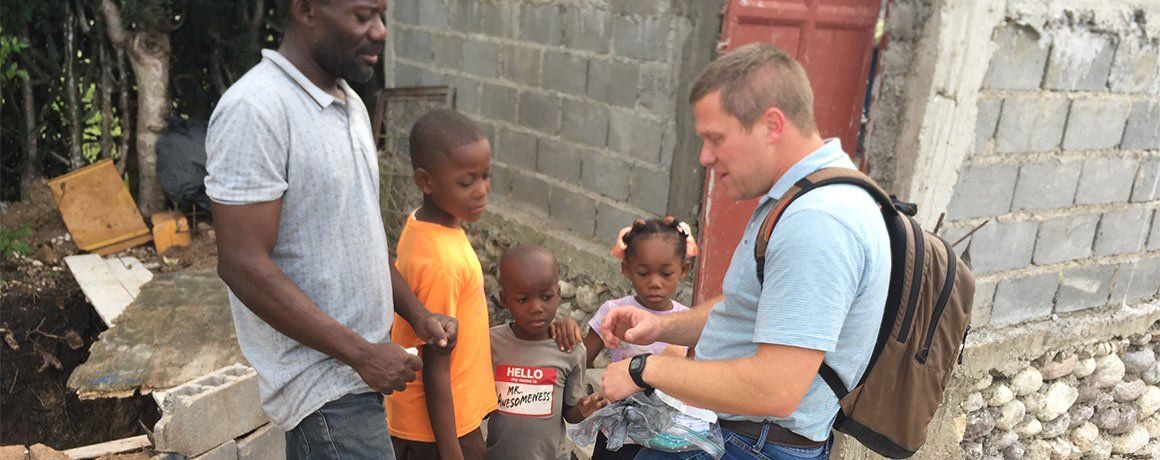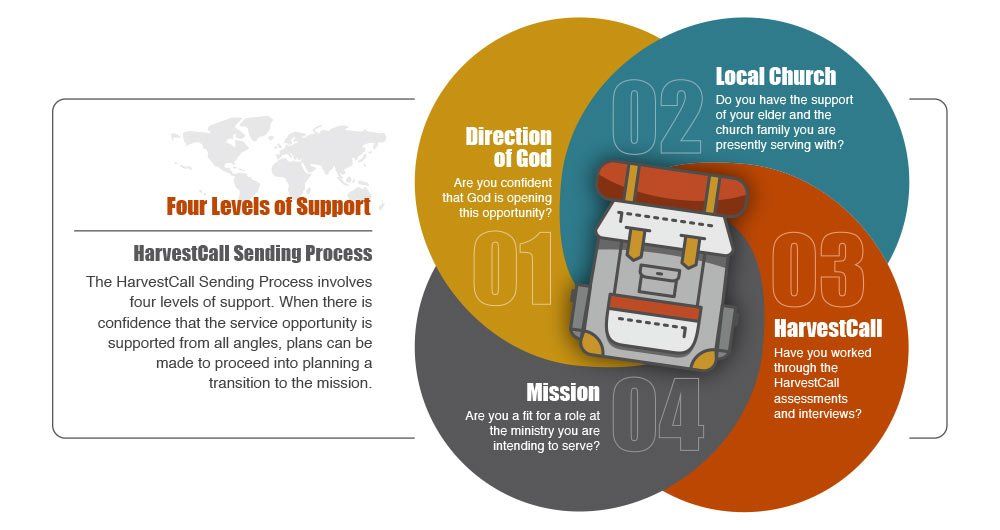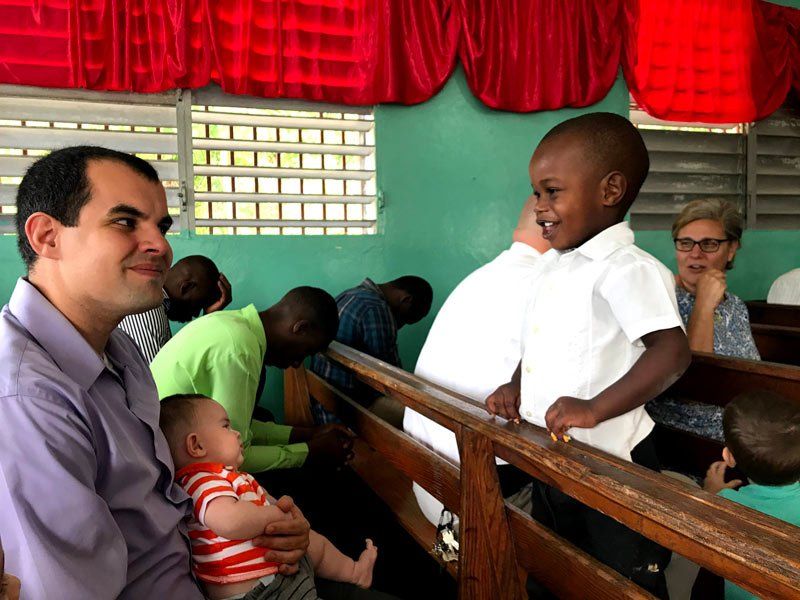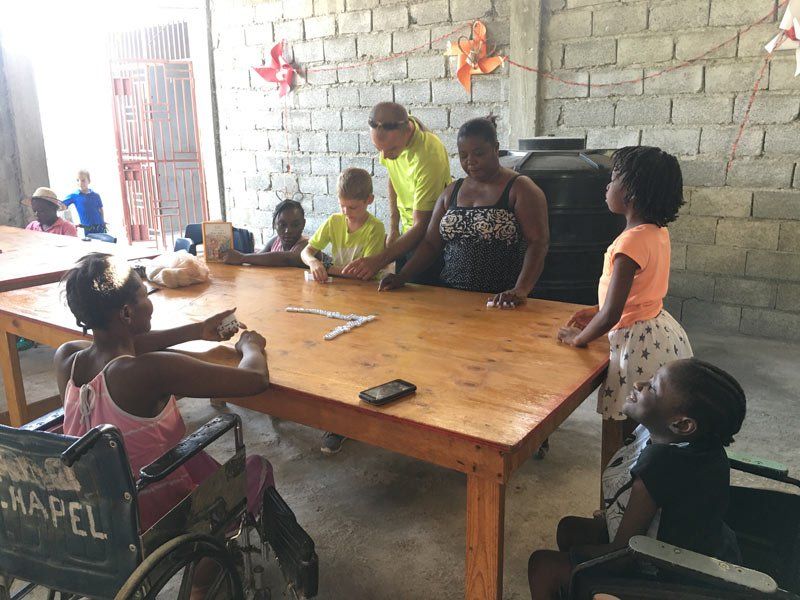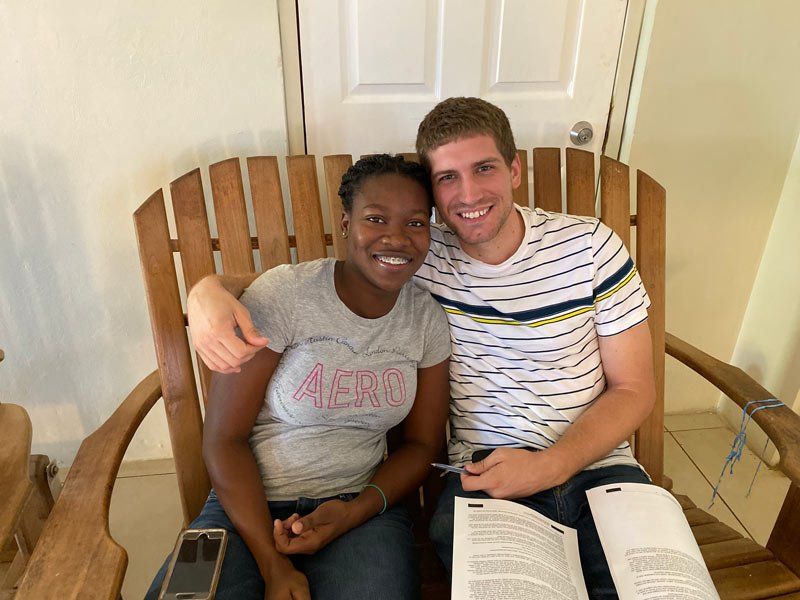Sending Process - Mid-term
This guide is for those being sent for a mid-term length role of 3+ years.
We are thankful that you have worked through the discernment process for this opportunity. If you have not, please go back to the discernment page. It is required that a discernment process be completed for all missionary service.
This process will be led by HarvestCall's Missionary Care Director.
Your process of being sent will involve two steps.
- Confirmation and Commissioning – Gathering support from your local church, HarvestCall, and the mission that you are fit for service and a fit for the role.
- Preparation and Sending – As much as is possible, preparing for service and maintaining connection to the local church.
Confirmation and Commissioning
The goal of the “Confirmation and Commissioning” phase is to confirm the Lord’s calling of brethren to be sent and commission them for the roles in which they have the needed gifts and perspective. HarvestCall will work with the mission/church and the sending church to guide the candidate through the confirmation process.
This process will involve assessing and aligning the candidate to the role. HarvestCall will provide emotional, spiritual and organizational support through each step of the process. The mission will also provide the candidate clear communication on the role as well as an assessment of the candidate’s ability to fulfill that role.
The selection process should be carried out as efficiently and thoroughly as possible. Each component of the process should be managed in light of the candidate’s privacy and with respect to his/her seeking the Lord’s will and guidance. Each situation will also be looked at individually. While the principles and processes will generally be followed, circumstances may dictate variations. In any circumstance, the candidate should receive full disclosure of the steps in the process and developments as they occur.
Confirmation process
The confirmation process consists seeking the direction of God through three primary phases that ultimately confirm the support of HarvestCall. It is important to note that the phases may not happen in the same order for each candidate.
- Local Church -- The local church primarily confirms support through the local church Elder. Before the process is initiated, the candidate is required to counsel with the local church Elder. His support both verbally to the candidate and to HarvestCall through the process outlined on the following pages is required for the candidate to go through the process. The confirmation process is expected to take approximately three weeks.
- HarvestCall -- The national church through HarvestCall confirms its support through the assessment portion of the process. This process utilizes a questionnaire, an assessment through Apostolic Christian Counseling and Family Services (ACCFS), and an interview with HarvestCall. HarvestCall facilitates this portion of the process and confirms the support of the Apostolic Christian Church with the candidate and the mission. See Pages 17-18 for more information. The Church/HarvestCall confirmation process could take approximately three months.
- Mission -- The mission (ex. Regional Committee or local church) that the candidate is interested in serving has responsibility for the final confirmation. The mission should initiate a process wherein they can assess the candidate regarding his/her ministry and spiritual readiness and “fit” with the mission and role. This confirmation process is expected to take approximately three weeks to complete.
Pre-placement ministry questionnaire
Candidates are asked to complete the Pre-Placement Questionnaire. This serves two purposes: 1) assists in getting to know the prospective candidate and 2) provides a way to pass information through the various steps of the process. This questionnaire will look and feel like a traditional job application, but it is not. The goal of this document is to give HarvestCall a glimpse at who the candidate is and what he/she believes. The questionnaire should be approached with honesty and transparency. The questionnaire should be used as an opportunity for the candidate to prayerfully think through various aspects that are important to establishing the Apostolic Christian Church’s support for his/her service.
ACCFS assessment
To facilitate certain functions of support throughout the process, HarvestCall has partnered with the Apostolic Christian Counseling and Family Services (ACCFS). Candidates will be asked to fill out the “Missionary Support Agreement.” ACCFS offers a variety of assessments and professional recommendations regarding the readiness of candidates including mental and marital health.
After completing the Missionary Support Agreement and prior to the interviews, the candidate will be asked to complete assessments with an ACCFS counsellor. This process generally involves two meetings and the completion of two assessments to explore mental and marital health. ACCFS will document their conclusions in a recommendation letter to communicate their perspective on the readiness of the candidate. If there are issues regarding readiness, a plan will be introduced to address the areas of concern. For the other phases of the missionary process, ACCFS offers interpersonal training and counseling.
Interview process
As a part of the process, HarvestCall conducts interviews with candidates across 11 dimensions. HarvestCall has a group of brothers and sisters trained in the STAR interviewing method. Three different interviewers doing three separate interviews is common for interviews.
The interviews are generally done by phone with the intention that at least one is done in person. The 11 interview dimensions include:
- Relationship with the Church - How a person interacts with the church and how these interactions affect his/her daily life.
- Call to Service - Having a Spirit-led motivation to service with an understanding of the service opportunity.
- Sound Doctrine and Bible Knowledge – Well-established in one’s faith with a strong knowledge of the Gospel.
- Servant and Team Orientation – Having an understanding of the personalities on the team and interacting appropriately with one another with a servant heart.
- Conflict Resolution - How a person deals with conflict with others and how he/she handles self-will.
- Character Traits – One’s character is established by being filled with the Spirit of God.
- Relationship with Family - How a person relates to his/her family which affects how he/she relates to others.
- Burden for Lost or Struggling Souls - Having compassion for others and desire for all to know the Gospel.
- Leadership and Submission - How a person relates within authority and also to those he/she has authority over.
- Cross-Cultural Life Adjustment – Experience and skills to successfully live and build relationships with those from a different cultural background
- Specialized Skills - God-given and learned skills and abilities enabling one to be productive and successful in a particular role.
The interviews are not intended to be “job interviews,” but instead are designed to be discussions whereby the interviewers and candidates can share together the call of God and the work that God is doing in their lives. After the interview process, the candidate will be notified of next steps.
Role of prayer
Since the goal of the confirmation and commissioning phase is for the Lord to confirm the calling that the missionary has received, it is vital for this part of the process to be fully surrendered to God. Prayer is critical to both seek God’s will for the process and for the missionary to prepare his/her heart to accept the conclusion of this phase, which will result in either support or a lack of support to move forward to the mission field.
Mission confirmation
The third phase of the interview process is the mission interview interview/assessment. This interview is with the mission/church where the prospective candidate is called to serve. This interview will focus more on professional skills and job fit with the mission and team. The timing of the interview with vary. Where roles are highly specialized and the candidate’s fit is a primary factor, the interview will happen early in the process. Most often, the interview will happen after the support of HarvestCall is given. The regional interview is entirely managed by each mission.
Background checks
For all roles, candidates will be asked to complete both Law Enforcement background checks as well as Child Protective Services checks. HarvestCall will cover the cost of the background checks and will make a formal request to confirm their support to complete the needed checks.
Communication of approval
Upon confirmation of the calling, the candidate should give prayerful and purposeful consideration to how this information will be shared with family members, church family, friends, employers, etc. While each situation is different, this information has the potential to be viewed positively or negatively. On the positive side, the calling provides a unique opportunity to serve and testify to the Lord’s work in the candidate’s life. There is also, however, the potential for hurt feelings due to separation and other sensitivities. Consideration should be given to ways to minimize these situations. When shared appropriately to brethren and the world, this communication can be God-honoring and edifying to the church.
Examples:
- Children -- help them feel that they are an integral part of the process and have a voice.
- Church members and friends – discuss the common calling to share the gospel and how God is now calling you to serve and share in a new place. Talk about the benefits of staying connected and receiving the church’s support.
- Unbelievers -- the candidate should share his/her testimony and how the purpose of this calling is to continue to share the gospel with those in the mission field.
Local church sending announcement / support
The local church is responsible for sending and supporting the brethren who are going. After the candidate’s calling is confirmed, the Elder is encouraged to inform the local church congregation. This messaging shows the support of the Elder as well as the Apostolic Christian Church for the one being sent. Several key messages should be communicated: 1) appropriate information about the new opportunity (mission, location, timing, etc.), 2) the church’s roles to “send” the missionary and 3) support him/her spiritually, financially and through fellowship.
Pulpit ministers
Brothers who were pulpit ministers in an established Apostolic Christian Church at the time of their commissioning do not maintain their role as a pulpit minister across the denomination when they move to the mission field. For a place without a local receiving church, it is the decision of the local sending church whether or not the brother should maintain his role as one of the pulpit ministers of the sending church. When the brother is being sent to a place with a local church, it is the shared decision of the local sending church as well as the receiving church whether or not the brother should maintain his pulpit ministry role. Occasionally, it may be requested that the brother retain his role as a pulpit minister when moving to the mission location. This would apply if the brother is being sent for the purpose of church leadership and/or preaching.
Preparation and Sending
HarvestCall is committed to the purposeful preparation and sending of brethren into missions to which they have been called. The goals of this phase are to 1) provide each goer with a level of readiness and 2) engage the church to “send” the brother/sister and help him/her thrive in their mission. While it is the Lord that sends laborers into the harvest, both HarvestCall and the sending church play major roles in this effort.
The preparation and sending phase begins after confirmation of the calling has been received by HarvestCall and the mission/church. The role of HarvestCall is to provide effective and relevant training for the brother/sister through developing and implementing a training plan as well as outlining other preparatory goals. The completion of the goals and training will enable the brother/sister to be sent to his/her mission field. The sending church is responsible for providing the primary spiritual, fellowship and physical support.
Preparation
The preparation phase will be guided by a preparation plan. This plan outlines the training components and other preparatory goals.
The primary accountability for the completion of the preparation plan will be on the brother/sister with support provided by a mentor. Some of the key areas of the plan, such as participating in an orientation and preparing spiritually, culturally, medically and financially, are discussed in more detail below.
Spiritual readiness
The most critical component of readiness and preparation is being prepared spiritually. Spiritual preparation is not about a checklist or a specific list of training classes. Instead, it is about the brother/sister developing a fully- dependent, obedient and intimate relationship with God. This involves utilizing and incorporating the Word of God in every aspect of life. Spiritual readiness will manifest itself through evidence of the Fruit of the Spirit, participation in the body of Christ and leading an overcoming life. Recommendations for spiritual preparation will be included in the preparation plan.
Cultural acquisition
In accordance with the HarvestCall “Ministry Practices” Guiding Principle #8, “we will strive to minister in ways that are respectful and relevant to indigenous cultures, being careful not to create dependency.” In an effort to apply this principle, a commitment to learning about and how to appropriately live in the culture being served is critical. Cultural acquisition is not necessarily the full adoption of and adherence to the local culture, but is a commitment to learn and respect the culture. The goal is to minister the gospel in such a way that the message is not hindered by cultural roadblocks. Learning a culture will likely involve living among those being served, building relationships, asking many questions and being willing to make mistakes. Books and other formal resources can also assist with cultural learning.
For cultural acquisition, it is recommended that at least one formal cultural training exercise be completed pre-field as well as a predetermined plan for learning during the first year of service. The Missionary Care Director can offer ideas for places/way this training can be acquired.
Language acquisition
HarvestCall believes in the full adoption of the local language of the people being served by the brother/sister. Since each brother/sister’s language proficiency is different, a language acquisition plan should be created with the mission. Often, initial portions of language learning can begin prior to transition to the field. In spite of the unique challenge of learning a language, every brother/sister should make a commitment to do this. Resources are available to assist through HarvestCall.
For language acquisition, it is required to do a “one year” equivalent training in the language within which you will be serving. This “one year” requirement can be done by completing two semesters of formal training, a term at a language training school, or with a combination of options. Because language learning can happen in a number of different ways, this is not necessarily a 12 month requirement. Rather, it is a principle of engaging in a committed, accountable, and credible language learning process. The language learning plan should be determined in collaboration with the Ministry Manager and Missionary Care Director. In general, it is highly recommended that this language learning happen “off site” of the ministry location.
Medical preparation
Often, medical precautions such as vaccinations are needed to serve in the mission area. The brother/sister is encouraged to ask those currently serving within the mission for recommendations and advice. Review the Center for Disease Control (CDC) website for the host country and abide by the recommendations for medical preparation. If the brother/sister does not wish to follow the CDC recommendations, he/she should discuss this with personnel in his/her respective mission.
Financial preparation
The financial support of missionaries is viewed as a shared responsibility between HarvestCall and the sending church. HarvestCall utilizes the Servant Fund as the primary financial support mechanism for Apostolic Christian missionaries. The sending church will be asked to collect a substantial portion of its missionary’s support for the Servant Fund and should also be prepared to assist with incidental expenses.
For the missionary, there are several requirements involved in financial preparation and documentation. Please see the New Missionary Financial Guide in the resource folder for a list of required information. Also, there are unique tax and planning considerations with the Servant Fund, a document outlining tax considerations is maintained for the missionaries.
Orientation
As part of the pre-field preparation, missionaries will be asked to participate in an orientation. This orientation is conducted by HarvestCall and provides some basic training on a broad range of topics related to service in the field and serving on behalf of the Apostolic Christian Church. In general, this will be completed with other missionaries who are going through the pre-field process at the same time.
Sending
Sending for a church is the act of setting apart of brethren to be commissioned for a task on behalf of the church. This is most clearly exhibited Biblically in Acts 13:1-3, but is demonstrated throughout the scriptures. In Matthew 9:38, we are instructed to “Pray ye therefore the Lord of the harvest, that he will send forth labourers into his harvest.” As such, it is the Lord who sends forth workers to the fields, but the local church, as the body of Christ, gives exhibition to that sending by both commissioning and supporting the work. In commissioning, the church is expressing its confidence in the work for which the worker is being sent. And, in support, they are expressing their engagement with the worker that is being sent.
Church communication
For the church to engage in its role of sending and supporting the brother/sister, the brethren need to be informed of the brother/sister’s calling and his/her work and the church’s role in support. The responsibility for this communication is shared between the sending church Elder and the brother/sister.
Sharing of God's work
Prior to leaving for a first term, a forum should be created for the brother/sister to share his/her calling and upcoming work with the church. As a part of this forum, the Elder or the Outreach Manager should share with the church their responsibility in supporting the brother/sister spiritually, relationally, and physically.
Similarly, during annual furlough, follow-up communication should be given to the home church. Consider choosing a different method for this communication each year. Examples of communication include having the brother/sister share his/her testimony at a hymn sing, presenting during a Wednesday evening service or after a Sunday service, having a special evening at the Fellowship Hall and presenting to the Sunday School or at a retirement home. (Note: When sharing a testimony with the sending church, the brother/sister should express appreciation for spiritual and financial support and fellowship.)
Sending service
Prior to the brother/sister’s transition, the church should conduct a sending service. This service typically involves the entire church and is coordinated under the direction of church leadership. The sending service communicates clearly that the local church is sending the brother/sister and that he/she will remain as an extension of the sending church.
Resource: Sending Services Document
Church support
To assist the church in fulfilling its responsibilities for support, two roles have been established to ensure all of the necessary support is maintained. A “mentor” is responsible for assisting the brother/sister in maintaining spiritual support and an “advocate” is responsible for the relational and physical support of the brother/sister by the church. These roles should work together, and those engaged in the roles are encouraged to leverage the gifts of the church to fulfil their roles.
Mentor support
Every goer will have a mentor who is chosen by the brother/sister. A mentor is a brother or sister in Christ who provides primary spiritual accountability to the brother/sister through the roles of listening, coaching and counseling. While the mentor does not need to be from the sending church, he/she will be functioning on behalf of the home Elder and therefore need to be confirmed by him. The mentor also acts as a liaison on behalf of the Elder to provide spiritual support. The foundation for the mentoring relationship between the brother/sister and the mentor should be consistent communication (at least two times per month).
Support team
A support team is a group of brothers and sisters from the sending church responsible for providing connection and fellowship with the sending church. Their role is to ensure that the church and the missionary are each taking responsibility for their roles in staying connected and communication. The support team is not meant to be the sole voice to and from the church, but is encouraged to engage the whole church in the role of supporting the brother/sister. The support team should have a special focus on prayer for the missionary.
Role of prayer
In preparation and sending, the brother/sister will need divine encouragement and direction in advance of moving to the field. The brother/sister should ask the Lord for wisdom, guidance and understanding to prepare him/her for the field. Due to the increased stress of transition, the brother/sister should continue to pray throughout this time.

